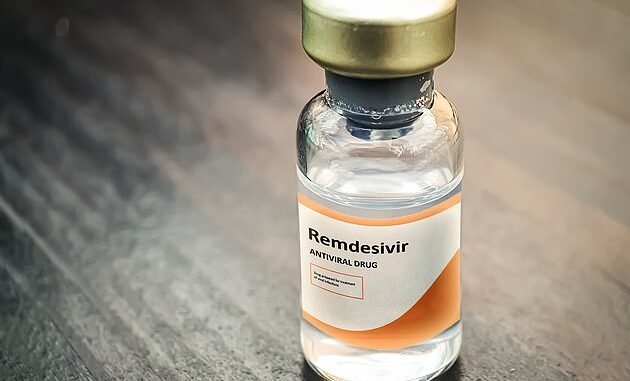
Gilead Sciences said that it has capacity to make enough doses of its drug remdesivir for ‘several million treatment courses’ next year in a Thursday press release announcing its first quarter earnings.
‘As Gilead continues to work with international partners to expand production, Gilead announced it anticipates more than one million treatment courses will be manufactured by December 2020, with plans to be able to produce several million treatment courses in 2021,’ the company said in its statement.
Wednesday, early results from a National Institutes of Health (NIH) study suggest the drug could improve survival odds for severely ill coronavirus patients by as much as 30 percent and speed their recovery time.
Gilead added that it’s already begun to ramp up production of the drug, an antiviral that it originally developed to treat Ebola, and can make enough 10-day courses to treat 140,000 by the end of May.
Earlier Thursday, the company’s CEO, Daniel O’Day, deemed the results a cause for ‘hope at a time when it is badly needed,’ in an open letter obtained by Fox News.
‘Positive data’ from a National Institutes of Health (NIH) trial of remdesivir sent the stock market soaring by 530 points on Wednesday.
After Dr Anthony gave details of the NIH study on Wednesday, the New York Times reported that the Food and Drug Administration (FDA) plans to give emergency use authorization for the drug to treat coronavirus patients – potentially that same day (the agency has not yet made a formal announcement to that effect).
‘Gilead also took significant steps to expand remdesivir manufacturing production,’ the company said in its press release.
‘However, [the timeline] projections assume a 10-day dosing duration, and the number of treatment courses expected to be available may actually be higher based on the recent topline results from the first Gilead SIMPLE study, which suggests the potential for certain patients to be treated with a shorter dosing duration.’
Wednesday, the same day that the preliminary data from the NIH trial were revealed, Gilead announced results from the first stage of its clinical trial of remdesivir in severely – but not critically – ill coronavirus patients.
Half of the 397 patients, who were sick enough to need additional oxygen but not to be placed on ventilators, improved within 10 days of a five-day treatment course and those who were on a 10-day regimen were better by the eleventh day.
More than half of the patients were discharged from the hospital within two weeks, Gilead announced in a press release.
The announcement of promising preliminary remdesivir results sent the Dow soaring by more than 500 points, though Gilead’s own stocks were halted pre-trading as it prepared to announce results of the trial.
And the mutual benefits seen whether patients treated with a five-day or 10-day course of the drug suggest that the company’s production potential could stretch twice as far as the projections announced Thursday.
Most people who contract coronavirus develop relatively mild or moderate illness.
Between March 1 and April 18, 9,483 Americans with confirmed coronavirus were hospitalized and reported to the Centers for Disease Control and Prevention (CDC).
That equates to a rate of about 1,355 people who become sick enough to need medical care and potentially oxygen support (though not necessarily mechanical ventilation).
If those rates remained stable, Gilead could handily make enough doses of remdesivir to treat every newly-hospitalized coronavirus patient with a 10-day treatment course well past May. In fact, 140,00 treatment courses would be enough to treat all newly-hospitalized patients in the US for 103 weeks.
However, the CDC’s figures are likely a significant undercount, considering that in New York, nearly a thousand people have been newly-hospitalized for coronavirus each of the past three days (and more in prior weeks and days).
Cases of coronavirus in the US surge past one million and deaths have eclipsed President Trump’s ‘best case scenario’ of 60,000 fatalities in the country.
To-date, there are no proven treatments for coronavirus, but the remdesivir results hint that there could be soon.
‘There is still more work to do and remdesivir has not been approved, but all of us at Gilead are humbled by what these promising results might mean for patients,’ O’Day wrote.
Outcomes for the members of the NIH’s trial of more than 1,090 people who were treated with remdesivir were better by a wide enough margin that Dr Fauci insinuated those who had been given a placebo should now get the drug.
‘You have an obligation to immediately let the people in the placebo group know so they can have access [to the potential treatment],’ Fauci said in a White House meeting.
Remdesivir is an antiviral medication that Gilead originally developed to treat Ebola, but it faltered in trials.
First petri dish and animal studies showed that it might bat back the coronavirus, and smaller studies were promising enough to prompt the NIH to launch a large, ‘gold standard’ trial of the drug.
END

Be the first to comment